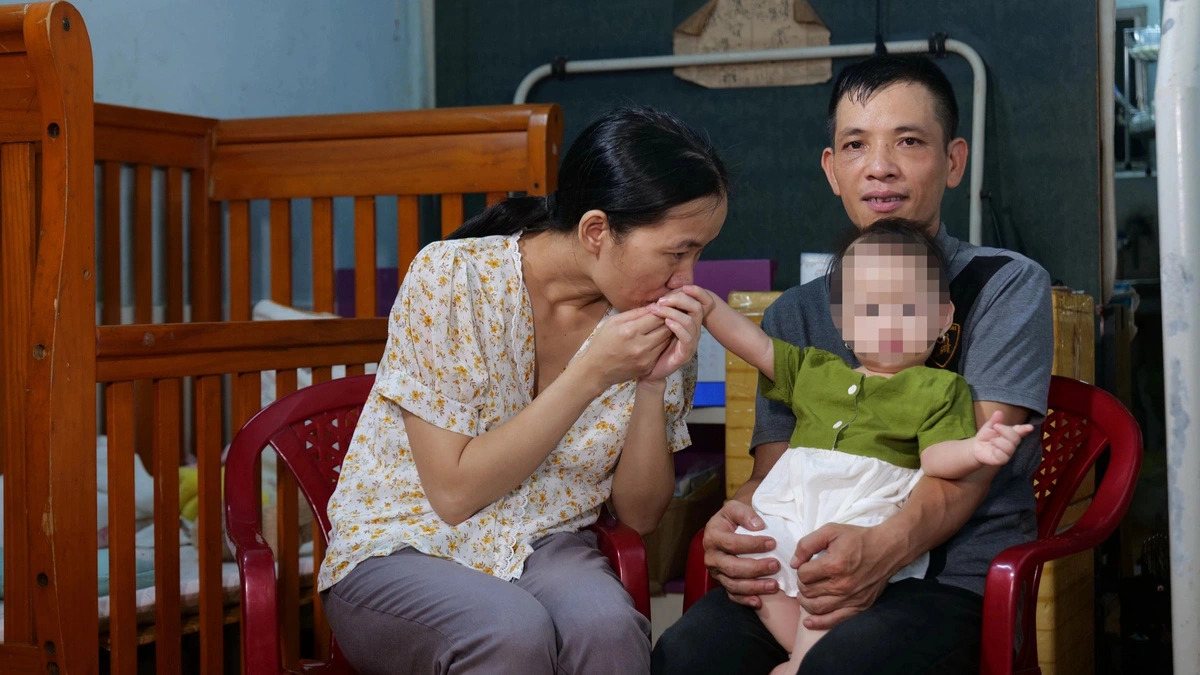As infertility rates increase, in vitro fertilization (IVF) is quickly becoming a popular option for couples struggling to conceive, but its high costs can put a significant financial strain on low-income families.
Tran Vuong Quan, 44, and his wife Nguyen Thi Suu, 39, married in late 2016, hoping to start a family but their fairytale took a turn after a year of trying, without success in conceiving.
Suu initially turned to traditional remedies.
When those failed, she sought medical help and testing, which revealed she had an ovulatory disorder, which greatly reduced her chances of conception.
Under the guidance of her doctors, Suu and her husband attempted intrauterine insemination (IUI), but their first attempt failed.
By 2019, they had saved enough to try IVF. The procedure went smoothly and, in mid-2020, Suu found out that she was pregnant.
But that joy was short-lived.
Just seven weeks into the pregnancy, Suu’s fetus lost its heartbeat.
“Having a child was everything to us, and it all crumbled so quickly,” Quan said.
In 2022, the couple were given a second chance at starting a family.
Thanks to the Uom mam hanh phuc (Nurturing Happiness) program at My Duc Hospital, they were selected as one of 80 couples to receive free IVF treatments during the program's ninth iteration.
This time, Suu managed to carry the pregnancy to term.
"The program renewed our hope after seven long years of trying," Quan shared.
Tran Thi Thuy Trang and Nguyen Thanh Giau, another Vietnamese couple, faced similar difficulties to Quan and Suu.
Trang, who suffers from polycystic ovary syndrome, had previously been unsuccessful with IUI and was unable to afford IVF.
Thanks to Uom mam hanh phuc, however, the financial burden of the procedure was lifted.
Trang and Giau were accepted into the program and, in November 2023, doctors were able to retrieve 15 eggs from Trang.
The next month they managed to perform a successful embryo transfer and, in August 2024, Trang welcomed a new child into the world.
Dr. Ho Ngoc Anh Vu, head of the IVF department at My Duc General Hospital (IVFMD Tan Binh), told Tuoi Tre (Youth) newspaper that the Uom mam hanh phuc program has helped 600 couples bear children since 2014.
Now in its 11th iteration, which runs from November 11, 2024 to July 31, 2025, the program aims to assist 100 couples out of a new facility.
Dr. Vu emphasized the importance of financially supporting low-income couples in light of rising infertility rates, noting that the program reflects IVFMD’s commitment to helping these couples achieve their dreams of parenthood.
According to the Ministry of Health, an estimated one million couples in Vietnam, or 7.7 percent, experience infertility each year.
Secondary infertility (infertility after a previous pregnancy) accounts for 3.8 percent, and alarmingly, this rate has been rising.
Currently, 15-20 percent of couples are affected, with over 50 percent of the cases falling into this category.
Professor Nguyen Thi Ngoc Phuong, former director of Tu Du Obstetrics and Gynecology Hospital in Ho Chi Minh City, who pioneered IVF in Vietnam and initiated the program, stressed the need to make advanced medical techniques accessible to everyone, not just to those who can afford them.
As part of the program, participating couples can receive full coverage for one IVF cycle, including medications and procedures for ovary stimulation, egg retrieval, embryo freezing, and embryo transfer.
"Having a child is a long and difficult journey for infertile couples," said Suu.
"Stay positive and hopeful as there is light at the end of the tunnel."
Like us on Facebook or follow us on Twitter to get the latest news about Vietnam!

















































